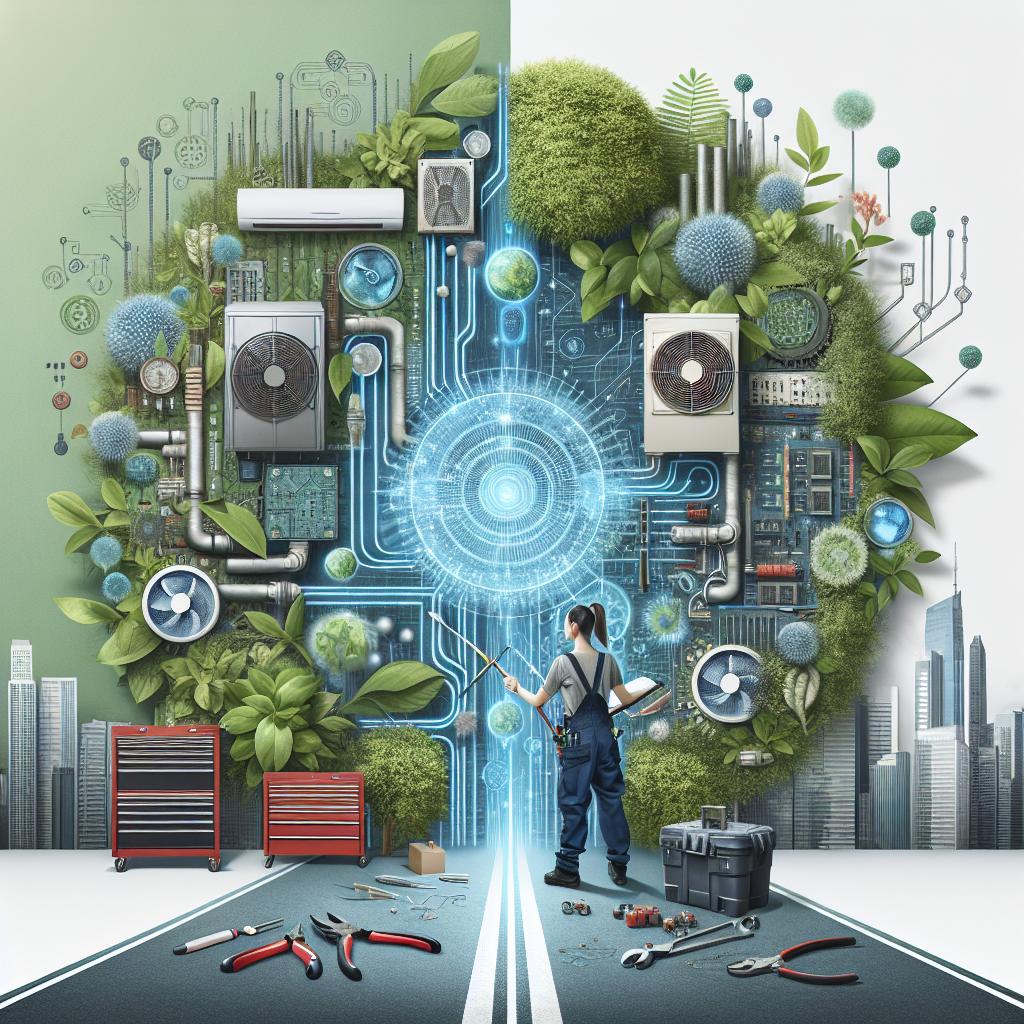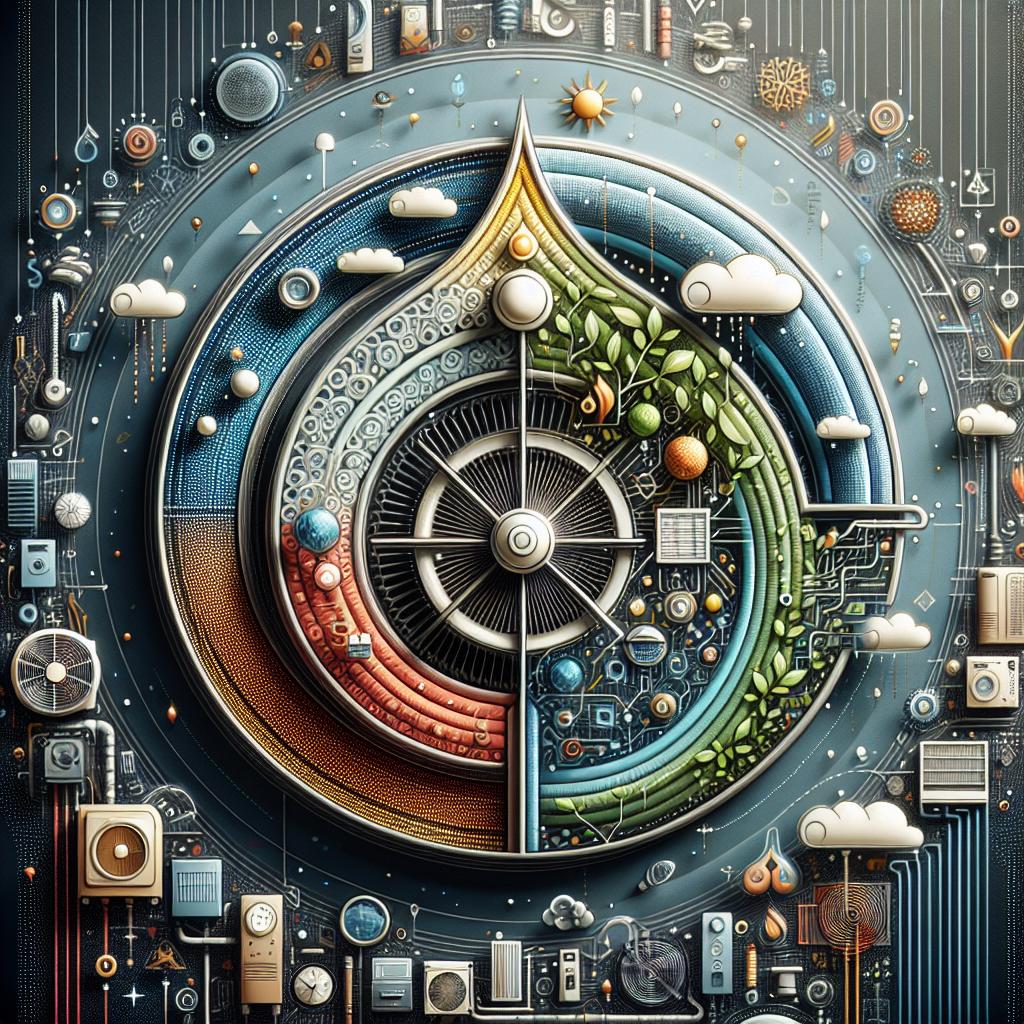When we step into our homes, we often take for granted the comfort enveloping us—a perfect blend of warmth in winter and cool respite during summer. Behind this invisible cocoon of comfort lies the expertise of HVAC technicians, the unsung heroes of our indoor climate. But what exactly do these skilled professionals do? Beyond the straightforward repair of air conditioning units and furnaces, HVAC techs play a vital role in ensuring optimal air quality, energy efficiency, and system reliability. In this article, we will explore the multifaceted responsibilities of HVAC technicians, shedding light on the intricate processes that keep our environments cozy, healthy, and efficient. Join us as we delve into the world of HVAC—a field that combines technology, mechanics, and a commitment to service in the pursuit of home comfort.
Understanding the Role of HVAC Technicians in Modern Comfort Systems
HVAC technicians serve as the backbone of modern climate control systems, ensuring that homes and businesses maintain optimal comfort year-round. Their expertise goes beyond mere installation and repair; they are trained to understand the complex interplay between heating, ventilation, and air conditioning components. This includes proficiency in assessing indoor air quality, which is crucial for both health and efficiency. Technicians analyze various factors such as humidity levels, airflow patterns, and insulation effectiveness to provide tailored solutions that enhance comfort while minimizing energy costs.
In addition to maintaining existing systems, HVAC professionals are pivotal in adopting new and innovative technologies that promote energy efficiency and sustainability. They often work with high-tech features like smart thermostats, variable refrigerant flow (VRF) systems, and advanced filtration. Their responsibilities typically encompass:
- Installing HVAC systems: Ensuring all components are correctly fitted and operational.
- Regular maintenance: Performing routine checks to prevent breakdowns.
- Troubleshooting issues: Diagnosing problems quickly and accurately.
- Providing customer education: Helping clients understand their systems and maintenance needs.

Key Skills and Certifications That Define an HVAC Professional
To excel in the HVAC industry, professionals must possess a blend of essential skills and relevant certifications that validate their expertise. Technical proficiency is paramount, encompassing knowledge of heating, ventilation, and air conditioning systems, as well as the ability to troubleshoot and repair mechanical failures. Additionally, strong communication skills are vital, allowing HVAC technicians to interact effectively with clients and explain complex issues in layman’s terms. Mastery of building codes and safety protocols is also crucial to ensure systems are installed and maintained in compliance with regulations.
The following certifications are often sought after in the HVAC field, as they enhance a technician’s credibility and career prospects:
| Certification | Description |
|---|---|
| EPA 608 Certification | Covers the handling of refrigerants in compliance with federal regulations. |
| NATE Certification | Validates skills and knowledge through rigorous testing in various HVAC specializations. |
| HVAC Excellence Certification | Demonstrates mastery in key HVAC principles and practices. |
Having these skills and certifications not only enhances employability but also equips HVAC technicians to undertake a wide range of tasks effectively, from routine maintenance to complex system installations. Continuous education and staying updated with technological advancements are equally important, ensuring that professionals remain competitive and knowledgeable in this ever-evolving field.

Troubleshooting Common HVAC Issues: Techniques and Best Practices
When faced with HVAC issues, mastering effective troubleshooting techniques can save homeowners time and money. One of the first steps is to conduct a visual inspection of the unit for any obvious signs of wear or damage. Pay attention to:
- Clogged Filters: Dirty air filters can restrict airflow and reduce efficiency.
- Leaking Ducts: Inspect for air leaks that may compromise heating or cooling.
- Disconnect Switches: Ensure that all switches are in the correct position and functioning.
In addition to visual checks, employing a systematic approach can help diagnose more complex problems. Consider using troubleshooting checklists to isolate issues methodically. Create a table that outlines some common HVAC problems and their potential solutions:
| Problem | Potential Solution |
|---|---|
| Noisy Operation | Check for loose or damaged components. |
| Inconsistent Temperatures | Inspect thermostat calibration and duct insulation. |
| Frequent Cycling | Examine refrigerant levels and service the compressor. |

The Future of HVAC: Innovations and Trends Shaping the Industry
The HVAC industry is on the brink of a technological revolution, characterized by sustainability and intelligent systems. Recent innovations have led to the development of high-efficiency systems that not only reduce energy consumption but also integrate seamlessly with smart home technology. These advancements allow for enhanced control through mobile applications, enabling homeowners to monitor and adjust their indoor climate remotely. In addition, the emergence of variable refrigerant flow (VRF) systems continues to gain traction, providing customizable heating and cooling options that optimize energy usage based on real-time demand.
Moreover, the trend toward using sensors and predictive analytics is reshaping the maintenance and operational strategies within the HVAC sector. By harnessing data from connected devices, technicians can identify potential issues before they escalate, minimizing downtime and repair costs. The incorporation of green technologies, such as solar-assisted HVAC systems, showcases a commitment to eco-friendly solutions. As the industry evolves, here are some key trends to watch:
- Smart Thermostats: Devices that learn preferences and adjust settings automatically.
- Renewable Energy Integration: HVAC systems designed to work with renewable energy sources.
- Indoor Air Quality Solutions: Technologies that monitor and improve air quality in real-time.
- Advanced Refrigerants: Development of refrigerants with lower environmental impact.
Q&A
Q&A: What Do HVAC Technicians Do?
Q1: What does HVAC stand for, and what does it encompass?
A1: HVAC stands for Heating, Ventilation, and Air Conditioning. It encompasses the systems and technologies that provide thermal comfort and acceptable indoor air quality in residential and commercial buildings. This includes not just heating and cooling systems but also ventilation methods that circulate and filter air.
Q2: What are the primary responsibilities of an HVAC technician?
A2: HVAC technicians wear many hats! Their primary responsibilities include installing, repairing, and maintaining HVAC systems. This involves working with installation units, diagnosing problems, replacing parts, and performing routine maintenance. They ensure that systems operate efficiently and meet safety standards.
Q3: What skills are essential for an HVAC technician?
A3: An HVAC technician needs a diverse skill set that includes mechanical aptitude, problem-solving abilities, and a solid understanding of electrical systems. They should be comfortable working with tools and technology, have excellent communication skills to explain issues to clients, and possess knowledge of local codes and regulations.
Q4: How can someone start a career as an HVAC technician?
A4: Starting a career in HVAC typically involves a combination of education and hands-on training. Many technicians attend trade schools or community colleges, earning certificates or associate degrees in HVAC technology. Apprenticeships provide on-the-job training under seasoned professionals, which is invaluable for gaining experience and honing skills.
Q5: What kind of environments do HVAC technicians work in?
A5: HVAC technicians work in a variety of environments, from residential homes to large commercial buildings, factories, and even remote sites. Their jobs can take them indoors and outdoors, where they may encounter weather conditions that make the workday an adventure—and necessitate a robust set of tools!
Q6: What are some common HVAC services technicians provide?
A6: Common HVAC services include installation and replacement of heating and cooling systems, conducting regular maintenance checks, troubleshooting and repairing faulty units, and performing air quality assessments. They also often advise on energy-saving techniques and recommend upgrades for better efficiency.
Q7: Why is regular maintenance of HVAC systems important?
A7: Regular maintenance is crucial for the longevity and efficiency of HVAC systems. It helps identify potential issues before they lead to costly repairs, improves energy efficiency, and ensures good air quality. Think of it as a well-deserved spa day for your heating and cooling systems!
Q8: How do HVAC technicians stay updated with technology and industry standards?
A8: HVAC technicians stay informed through ongoing education and training programs, attending workshops, and acquiring certifications. The industry is continuously evolving with new technologies and regulations, so staying current is vital for both safety and effectiveness in their work.
Q9: What are the job prospects for HVAC technicians?
A9: Job prospects for HVAC technicians are quite strong, driven by the continual need for climate control systems in both new construction and existing infrastructure. As energy efficiency becomes increasingly vital, the demand for skilled technicians who can install and maintain cutting-edge systems is expected to grow.
Q10: What makes being an HVAC technician rewarding?
A10: Many HVAC technicians find reward in the problem-solving aspects of their job, as well as the satisfaction derived from making homes and businesses comfortable. Helping people enjoy their indoor environments and ensuring safety through proper maintenance can be immensely fulfilling. Plus, the opportunity for career growth and specialization adds to the allure of this dynamic profession.
The Conclusion
As we draw the curtains on our exploration of the world of HVAC technicians, it becomes clear that their role is far more intricate than merely fixing heating and cooling systems. These skilled professionals are the unsung heroes of our indoor comfort, blending technical prowess with a deep understanding of climate control. From maintaining optimal temperatures in our homes to ensuring energy efficiency in large commercial structures, HVAC techs are pivotal in creating and sustaining environments that promote well-being and productivity.
So, the next time you feel that refreshing breeze on a sweltering summer day or find solace in a warm room during winter’s chill, take a moment to appreciate the expertise and dedication of the HVAC technicians behind the scenes. These professionals not only keep us comfortable but also play a crucial role in protecting our investment in our buildings and minimizing our environmental footprint. In a world where comfort and sustainability go hand in hand, HVAC techs are more essential than ever, reminding us that behind every breath of fresh air, there lies a story of skill, service, and innovation.

